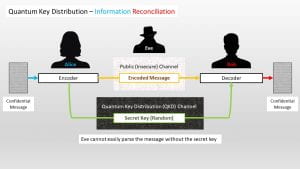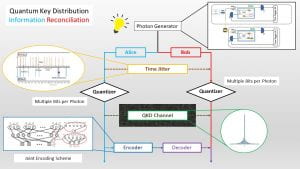Algorithms for Quantum Information Systems
Overview
Secure communication has long been an indispensable part of numerous systems, ranging from the more traditional such as finance and defense to the emerging ones such as the internet of (battlefield) things and health data management. Traditional data encryption methods based on using public keys are threatened by the advances in quantum computing algorithms promising to efficiently solve otherwise intractable problems which make public key encryption secure. However, it is precisely quantum information processing advances that are also expected to enable secure communications by allowing efficient and secure private key distribution. The main advantage of private key encryption is that as long as the key strings are truly secret, it is provably secure, that is, insensitive to advances in computing. A Quantum Key Distribution (QKD) protocol describes how two parties, commonly referred to as Alice and Bob, can establish a secret key by communicating over a quantum and a public classical channel that both can be accessed by an eavesdropper Eve. For the widespread adoption of QKD, it is mandatory to provide high key rates over long distances. What has appeared as a bottleneck in practice is the inability to maximize the utility of information-bearing quantum states. This project seeks to solve this inefficiency problem through advanced coding schemes tailored for the future quantum communication systems.
Recent results
We first investigated the channel statistics for discrete variable (DV) QKD based on energy-time entangled photons. We then established a so-called balanced modulation scheme that is promising for this channel. Based on the modulation, we proposed a joint local-global graph coding scheme that is expected to achieve good error-correction performance. Our current designs use both block LDPC and spatially-coupled based codes.
Recent Publications:
- S. Yang, M. Can Sarihan, K.-C. Chang, C.W. Wong, and L. Dolecek, “Efficient Information Reconciliation for Energy-Time Entanglement Quantum Key Distribution,” Asilomar Conference on Signals, Systems, and Computers, Monterey, CA, Nov. 2019.


